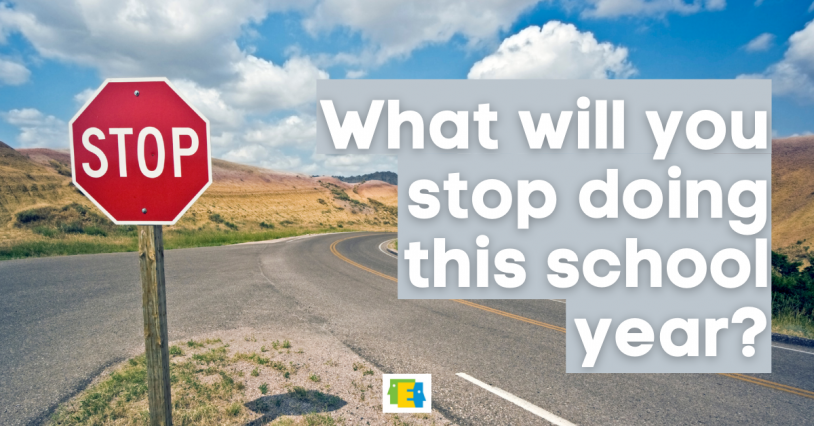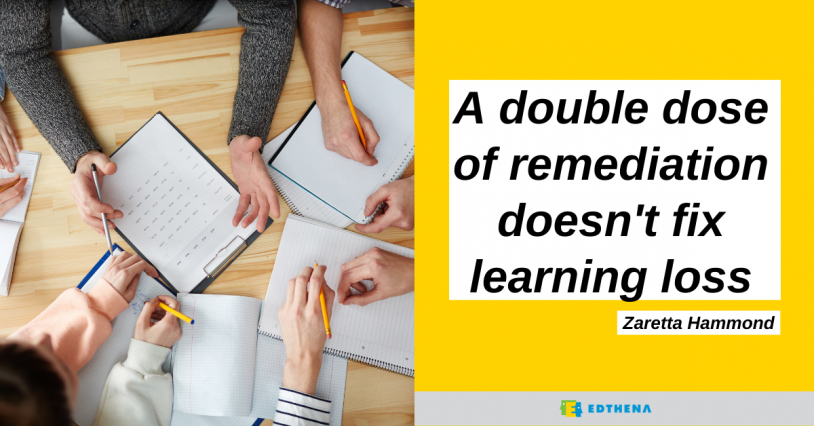For a Successful Year of Student Learning, Stop Doing These 3 Things
As many schools resume in-person classrooms for student learning, there’s a lot to consider to make the new school year successful. With learning loss on many minds, it’s time to think about the ineffective strategies we should do away with. What should school leaders and teachers stop doing?
We talked with Zaretta Hammond about culturally responsive teaching and she had ideas for “small but high leverage changes [that lead to] positive, disruptive innovation” for schools.
In a #PLtogether Lounge Talk, Zaretta Hammond, author of Culturally Responsive Teaching and the Brain, had a conversation with Edthena founder and CEO Adam Geller, and the two discussed the future of successful student learning.
Wondering what to say “no” to this school year? Watch the interview above, or read on for highlights of Zaretta’s 3 things to stop doing.

Stop taking the autonomy out of student learning
Students must be in the driver’s seat of their own learning. Zaretta urged leaders to consider, “How do we give more autonomy to students for their own learning?”
The pandemic and distance learning both contributed to several positive outcomes on this front. Zaretta said, they “actually create[d] space for teachers to innovate, for students to be co-creators, for parents to be in relationships [with teachers] in new ways.”
In fact, she noted that many students thrived outside of usual schooling. This shouldn’t be forgotten with the return to in-classroom teaching.
Now’s the time to continue “to give students more autonomy around their own learning in ways that are intellectually engaging, and stimulate intellectual curiosity,” Zaretta stated.
Whether this is in the form of kids comparing work on Zoom or hands-on science projects, students learn in different ways and can be the leaders of how they master understanding.
Stop overdoing the remediation
With learning loss due to more than a year of interrupted student learning, there is a temptation to overcorrect with remediation of instruction. If students missed instruction, the instinct might be to give students a double dose now. 
But Zaretta warns against double dose schedules for students.
“This is where the knowledge of culturally responsive instruction to accelerate comes in,” she said. “We’re actually gonna be teaching students how to learn new content, so they can accelerate for themselves.”
Learning new content and new approaches to material are key to students’ continued learning and progress. Giving students feedback and conferencing with them are also ways to help them move forward, instead of looking back.
Stop being scared of letting students struggle
‘Productive struggle’ is when students work through a learning struggle independently before a teacher offers support. This is a careful but important balance to strike for classrooms.
Zaretta likened this to the role of a personal trainer. A personal trainer can’t do everything for a person getting in shape.
Rather, Zaretta noted, “What the trainer does is understand your goals, and your level of motivation, puts a program together and coaches you through.”
In the same way, teachers act as personal trainers for students’ cognition by giving and coaching them to use tools for learning. When students are grappling with new material, that allows more brain pathways to grow, and then students begin to see and understand complex relationships.
In order to progress, students must reach a point where they use their own confusion as clues to their learning.
Zaretta cited various questions students should be asking themselves, such as “Where was I confused?” and “How do we use errors as information?”
And for teachers? Zareta said, “[They] should be committed to helping students understand how to use errors as information.”
With lifelong learning skills, students can assess for themselves their misunderstandings and work through them, with the teacher’s feedback and support.
Start the school year by stopping old ideas
Autonomy, new content, and struggle: these may sound like scary ideas for a school year already filled with uncertainty. But sometimes progress can only be made by moving forward and letting go of old ideas that never really worked in the first place.
Want to hear what Zaretta Hammond said about culturally responsive teaching? Read our highlights and watch the video.



